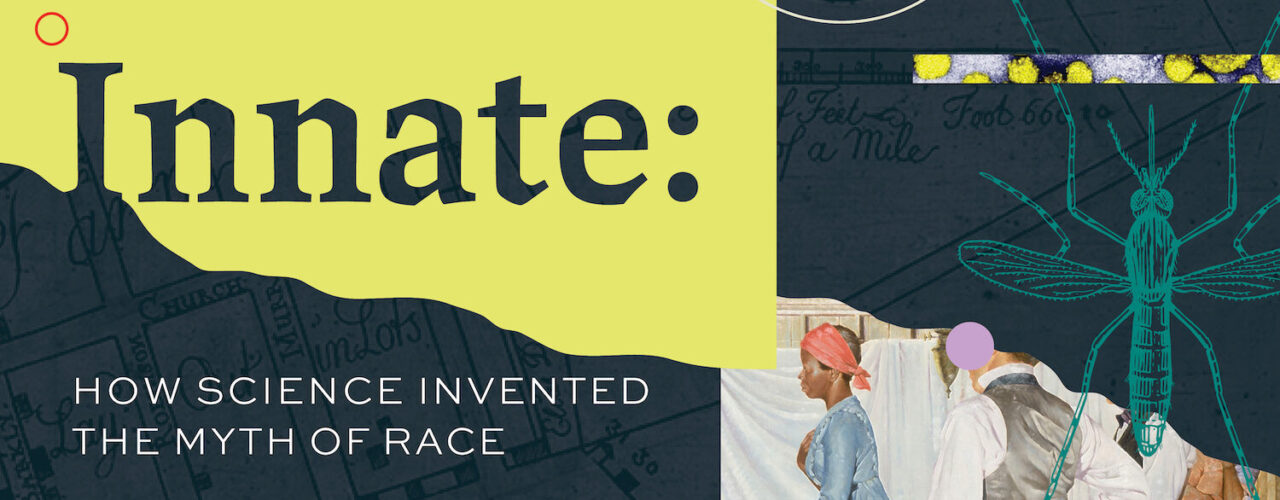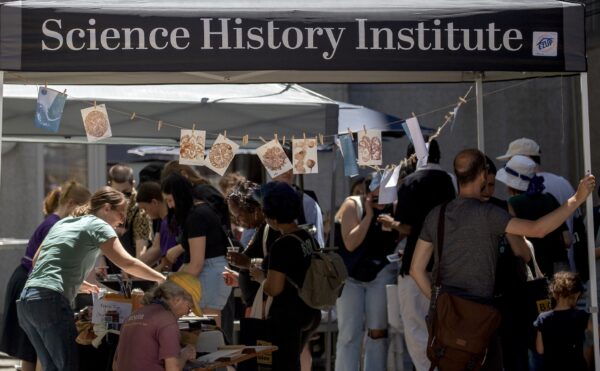
Science History Institute Launches ‘Innate: How Science Invented the Myth of Race’
The podcast and magazine project explores the historical roots and persistent legacies of racism in American science and medicine.
The Science History Institute announces the launch of Innate: How Science Invented the Myth of Race, a multimedia project exploring the history, sociology, and legacy of racism in science and medicine. Published through Distillations, the Institute’s highly acclaimed digital content platform, the project features ten podcast episodes and three magazine features that will examine the scientific origins of support for racist theories, practices, and policies. We will also host a number of public events highlighting the stories told through the project.
The Institute invites the public to a free First Friday event on February 3, 2023, 5pm–7pm at 315 Chestnut Street in Old City Philadelphia. This event kicks off the project with a live listening party and Q&A with the Distillations podcast team. Attendees will learn how the season and project came together, hear clips and bonus audio, and join the conversation with our producers and hosts.
“Our mission is to ‘tell the stories behind the science,’ which entails expanding knowledge and challenging perspectives in the history of science,” says Institute president and CEO David Cole. “Examining the historical roots of theories of ‘race’ and related perspectives in science and medicine is crucial to presenting more complex and comprehensive accounts of the scientific present to our audiences.”
The centerpiece of Innate is the production of ten in-depth Distillations podcast episodes, which will weave a narrative through both international and Philadelphia-based stories. A new episode will be released weekly starting on Tuesday, February 7, 2023. Some of the histories the series will dive into include how the field of gynecology was built on the bodies of enslaved women, how San Francisco’s public health department targeted and blamed residents of the city’s Chinatown neighborhood during the plague outbreak in 1900, and how medical students and doctors have been trying to do away with race correction tools once and for all.
“As we began researching this project more than a year ago, we discovered the social concept of race had been built into the foundation of science as an innate element located within the body. This concept has carried through for centuries and is part of the framework of science today,” adds Alexis Pedrick, the Institute’s director of digital engagement who leads the project and is also the cohost of the podcast. “We also wanted to understand why this myth of racial difference still exists within science and if and how the legacy of racism is being corrected.”
The Innate podcast season will be accompanied by three Distillations magazine articles that speak directly to the thematic questions around the cost of exclusion and the damage of racism in scientific practice. Journalist Julia Craven will tell the story of chemists Connie Stanley and John Sligh Jr., who were murdered in 1975 during a racist shooting spree in suburban Washington, D.C. Journalist Padmini Raghunath, a producer of the podcast series, will examine the origins of behavioral genetics and longstanding problems that have hamstrung the field. The project also includes a personal essay penned by Pedrick, who will reflect on being a woman of color in the science communication field, examine the legacy of chemist Percy Lavon Julian, and explore how the history of science complicates the rallying cry of “Black excellence.”
In addition to the public kick-off event on February 3, the Institute will also present two virtual lectures featuring race and science scholars whose work helped shape the project. In March (date TBD) we will also host an in-person event at the Lazaretto (97 Wanamaker Avenue, Essington, Pennsylvania), the United States’ first quarantine station. Built in response to Philadelphia’s 1793 yellow fever outbreak, this historic site is the topic of one of the project’s podcast episodes. The public is invited to join Innate project staff and scholar Rana Hogarth for a talk and tour exploring how yellow fever brought racial tensions to the surface and how we can learn from past public health crises.
Innate: How Science Invented the Myth of Race is made possible in part by a major grant from the National Endowment for the Humanities: Democracy demands wisdom.
More Press
Science History Institute’s Annual Curious Histories Fest Asks ‘What’s for Lunch?’
The free, daylong celebration of the history of food science takes place Saturday, June 14, 11am–3pm.
Science History Institute to Install New Exhibit Space, Renovate Lobby, and Add Digital Production Studio and Gift Shop
Our museum will be temporarily closed until March 19, 2025, with a new exhibition slated to open in May 2025.
Science History Institute’s New Exhibition Asks: What’s Behind the School Lunch?
Lunchtime: The History of Science on the School Food Tray opens September 27.



